KSysGuard/es: Difference between revisions
(Created page with "'''KSysGuard''' está diseñado para hacer que el control simple de procesos esté disponible a un usuario sin necesidad de configuraciones adicionales - los valores predefinidos...") |
(Created page with "===Carga del sistema===") |
||
| Line 8: | Line 8: | ||
'''KSysGuard''' está diseñado para hacer que el control simple de procesos esté disponible a un usuario sin necesidad de configuraciones adicionales - los valores predefinidos normalmente son adecuados. Hay dos hojas de trabajo - la página de <menuchoice>Carga del sistema</menuchoice>, mostrada arriba, y la <menuchoice>Tabla de procesos</menuchoice>. | '''KSysGuard''' está diseñado para hacer que el control simple de procesos esté disponible a un usuario sin necesidad de configuraciones adicionales - los valores predefinidos normalmente son adecuados. Hay dos hojas de trabajo - la página de <menuchoice>Carga del sistema</menuchoice>, mostrada arriba, y la <menuchoice>Tabla de procesos</menuchoice>. | ||
=== | ===Carga del sistema=== | ||
The <menuchoice>System Load</menuchoice> screen has three displays, each representing one of the load considerations - CPU History, Memory and Swap History and Network History. If you hover over the title-bar of each section you will see detailed analysis together with a colour-key. | The <menuchoice>System Load</menuchoice> screen has three displays, each representing one of the load considerations - CPU History, Memory and Swap History and Network History. If you hover over the title-bar of each section you will see detailed analysis together with a colour-key. | ||
Revision as of 17:23, 10 February 2011
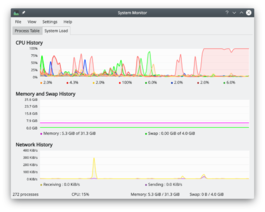 |
Registra y controla los procesos activos en tu sistema |
General
KSysGuard está diseñado para hacer que el control simple de procesos esté disponible a un usuario sin necesidad de configuraciones adicionales - los valores predefinidos normalmente son adecuados. Hay dos hojas de trabajo - la página de , mostrada arriba, y la .
Carga del sistema
The screen has three displays, each representing one of the load considerations - CPU History, Memory and Swap History and Network History. If you hover over the title-bar of each section you will see detailed analysis together with a colour-key.
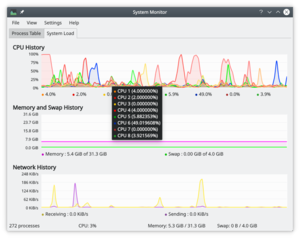 |
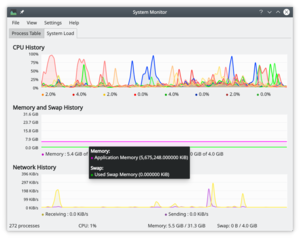 |
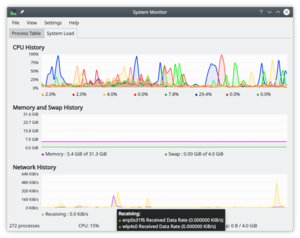 |
The Process Table
The view by default gives you an alphabetical order list of all processes running. Clicking on any column header will make this the sort column. If you have a runaway process you will find the view most useful. You can also elect to see sub-sets of the processes, by owner or program.
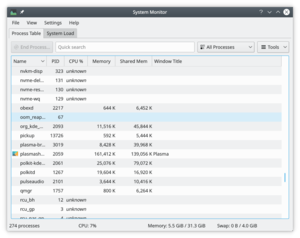 |
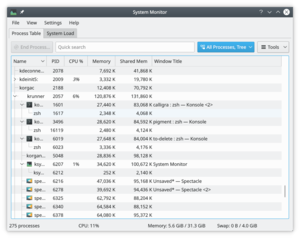 |
Hints and Tips
Ctrl + Esc brings up the Processes part of KSysGuard, which is very helpful when you are trying to find which application is using too many resources.
In KRunner (Alt + F2 or from a right-click on the desktop) there is a tiny icon to the left of the entry bar - it looks like a microwave oven - that also brings up the Process Table.
